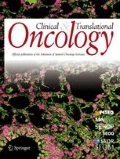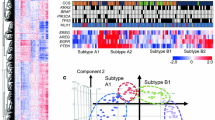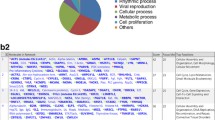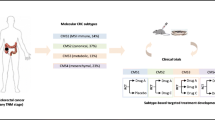Abstract
Purpose
FOLFOX (a combination of leucovorin, fluorouracil and oxaliplatin) has achieved substantial success in the treatment of colorectal cancer (CRC) patients. However, about half of all patients show resistance to this regimen and some develop adverse symptoms such as neurotoxicity. In order to select patients who would benefit most from this therapy, we aimed to build a predictor for the response to FOLFOX using microarray gene expression profiles of primary CRC samples.
Patients and methods
Forty patients who underwent surgery for primary lesions were examined. All patients had metastatic or recurrent CRC and received modified FOLFOX6. Responders and nonresponders were determined according to the best observed response at the end of the first-line treatment. Gene-expression profiles of primary CRC were determined using Human Genome GeneChip arrays U133. We identified discriminating genes whose expression differed significantly between responders and nonresponders and then carried out supervised class prediction using the k-nearest-neighbour method.
Results
We identified 27 probes that were differentially expressed between responders and nonresponders at significant levels. Based on the expression of these genes, we constructed a FOLFOX response predictor with an overall accuracy of 92.5%. The sensitivity, specificity, positive and negative predictive values were 78.6%, 100%, 100% and 89.7%, respectively.
Conclusion
The present model suggests the possibility of selecting patients who would benefit from FOLFOX therapy both in the metastatic and the adjuvant setting. To our knowledge, this is the first study to establish a prediction model for the response to FOLFOX chemotherapy based on gene expression by microarray analysis.
Similar content being viewed by others
References
Weitz J, Koch M, Debus J et al (2005) Colorectal cancer. Lancet 365:153–165
de Gramont A, Figer A, Seymour M et al (2000) Leucovorin and fluorouracil with or without oxaliplatin as first-line treatment in advanced colorectal cancer. J Clin Oncol 18:2938–2947
Goldberg RM, Sargent DJ, Morton RF et al (2004) A randomized controlled trial of fluorouracil plus leucovorin, irinotecan, and oxaliplatin combinations in patients with previously untreated metastatic colorectal cancer. J Clin Oncol 22:23–30
Saltz LB, Cox JV, Blanke C et al (2000) Irinotecan plus fluorouracil and leucovorin for metastatic colorectal cancer. Irinotecan Study Group. N Engl J Med 343:905–914
Douillard JY, Cunningham D, Roth AD et al (2000) Irinotecan combined with fluorouracil compared with fluorouracil alone as first-line treatment for metastatic colorectal cancer: a multicentre randomised trial. Lancet 355:1041–1047
Adlard JW, Richman SD, Seymour MT et al (2002) Prediction of the response of colorectal cancer to systemic therapy. Lancet Oncol 3:75–82
Watanabe T, Wu TT, Catalano PJ et al (2001) Molecular predictors of survival after adjuvant chemotherapy for colon cancer. N Engl J Med 344:1196–1206
Watanabe T, Komuro Y, Kiyomatsu T et al (2006) Prediction of sensitivity of rectal cancer cells in response to preoperative radiotherapy by DNA microarray analysis of gene expression profiles. Cancer Res 66:3370–3374
Watanabe T, Kobunai T, Toda E et al (2006) Distal colorectal cancers with microsatellite instability (MSI) display distinct gene expression profiles that are different from proximal MSI cancers. Cancer Res 66:9804–9808
Del Rio M, Molina F, Bascoul-Mollevi C et al (2007) Gene expression signature in advanced colorectal cancer patients select drugs and response for the use of leucovorin, fluorouracil, and irinotecan. J Clin Oncol 25:773–780
Cheeseman SL, Joel SP, Chester JD et al (2002) A ‘modified de Gramont’ regimen of fluorouracil, alone and with oxaliplatin, for advanced colorectal cancer. Br J Cancer 87:393–399
Hochster HS, Hart LL, Ramanathan RK et al (2008) Safety and efficacy of oxaliplatin and fluoropyrimidine regimens with or without bevacizumab as first-line treatment of metastatic colorectal cancer: results of the TREE Study. J Clin Oncol 26:3523–3529
Therasse P, Arbuck SG, Eisenhauer EA et al (2000) New guidelines to evaluate the response to treatment in solid tumors. European Organization for Research and Treatment of Cancer, National Cancer Institute of the United States, National Cancer Institute of Canada. J Natl Cancer Inst 92: 205–216
Broberg P (2003) Statistical methods for ranking differentially expressed genes. Genome Biol 4:R41
Cover TM, Hart PE (1967) Nearest neighbor pattern classification. IEEA Trans Inf Theory IT-1: 21–27
Raymond E, Faivre S, Woynarowski JM et al (1998) Oxaliplatin: mechanism of action and antineoplastic activity. Semin Oncol 25:4–12
Park DJ, Stoehlmacher J, Zhang W et al (2001) A Xerodermapigmentosum group D gene polymorphism predicts clinical outcome to platinumbased chemotherapy in patients with advanced colorectal cancer. Cancer Res 61:8654–8658
Stoehlmacher J, Park DJ, Zhang W et al (2004) A multivariate analysis of genomic polymorphisms: prediction of clinical outcome to 5-FU/oxaliplatin combination chemotherapy in refractory colorectal cancer. Br J Cancer 91:344–354
Pare L, Marcuello E, Altes A et al (2008) Pharmacogenetic prediction of clinical outcome in advanced colorectal cancer patients receiving oxaliplatin/5-fluorouracil as first-line chemotherapy. Br J Cancer 99:1050–1055
Park DJ, Zhang W, Stoehlmacher J et al (2003) ERCC1 gene polymorphism as a predictor for clinical outcome in advanced colorectal cancer patients treated with platinum-based chemotherapy. Clin Adv Hematol Oncol 1:162–166
Viguier J, Boige V, Miquel C et al (2005) ERCC1 codon 118 polymorphism is a predictive factor for the tumor response to oxaliplatin/5-fluorouracil combination chemotherapy in patients with advanced colorectal cancer. Clin Cancer Res 11:6212–6217
Ruzzo A, Graziano F, Loupakis F et al (2007) Pharmacogenetic profiling in patients with advanced colorectal cancer treated with first-line FOLFOX-4 chemotherapy. J Clin Oncol 25:1247–1254
Martinez-Balibrea E, Abad A, Aranda E et al (2008) Pharmacogenetic approach for capecitabine or 5-fluorouracil selection to be combined with oxaliplatin as first-line chemotherapy in advanced colorectal cancer. Eur J Cancer 44:1229–1237
Kim SH, Kwon HC, Oh SY et al (2009) Prognostic value of ERCC1, thymidylatesynthase, and glutathione S-transferase pi for 5-FU/oxaliplatin chemotherapy in advanced colorectal cancer. Am J Clin Oncol 32:38–43
Kwon HC, Roh MS, Oh SY et al (2007) Prognostic value of expression of ERCC1, thymidylatesynthase, and glutathione S-transferase P1 for 5-fluorouracil/oxaliplatin chemotherapy in advanced gastric cancer. Ann Oncol 18:504–509
Shirota Y, Stoehlmacher J, Brabender J et al (2001) ERCC1 and thymidylatesynthase mRNA levels predict survival for colorectal cancer patients receiving combination oxaliplatin and fluorouracil chemotherapy. J Clin Oncol 19:4298–4304
Arango D, Wilson AJ, Shi Q et al (2004) Molecular mechanisms of action and prediction of response to oxaliplatin in colorectal cancer cells. Br J Cancer 91:1931–1946
Poola I, Abraham J, Marshalleck JJ et al (2008) Molecular risk assessment for breast cancer development in patients with ductal hyperplasias. Clin Cancer Res 14:1274–1280
Tan JX, Ren GS, Tu G et al (2006) Effect of silencing of hyaluronidase gene HYAL1 by RNA interference on proliferation of human breast cancer cells. Ai Zheng 25:844–848
Corjay MH, Kearney MA, Munzer DA et al (1998) Antiproliferative gene BTG1 is highly expressed in apoptotic cells in macrophage-rich areas of advanced lesions in Watanabe heritable hyperlipidemic rabbit and human. Lab Invest 78: 847–858
Author information
Authors and Affiliations
Corresponding author
Rights and permissions
About this article
Cite this article
Watanabe, T., Kobunai, T., Yamamoto, Y. et al. Gene expression signature and response to the use of leucovorin, fluorouracil and oxaliplatin in colorectal cancer patients. Clin Transl Oncol 13, 419–425 (2011). https://doi.org/10.1007/s12094-011-0676-z
Received:
Accepted:
Published:
Issue Date:
DOI: https://doi.org/10.1007/s12094-011-0676-z




